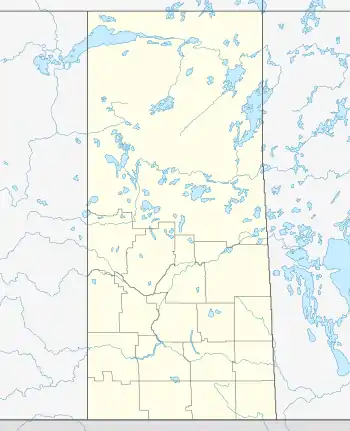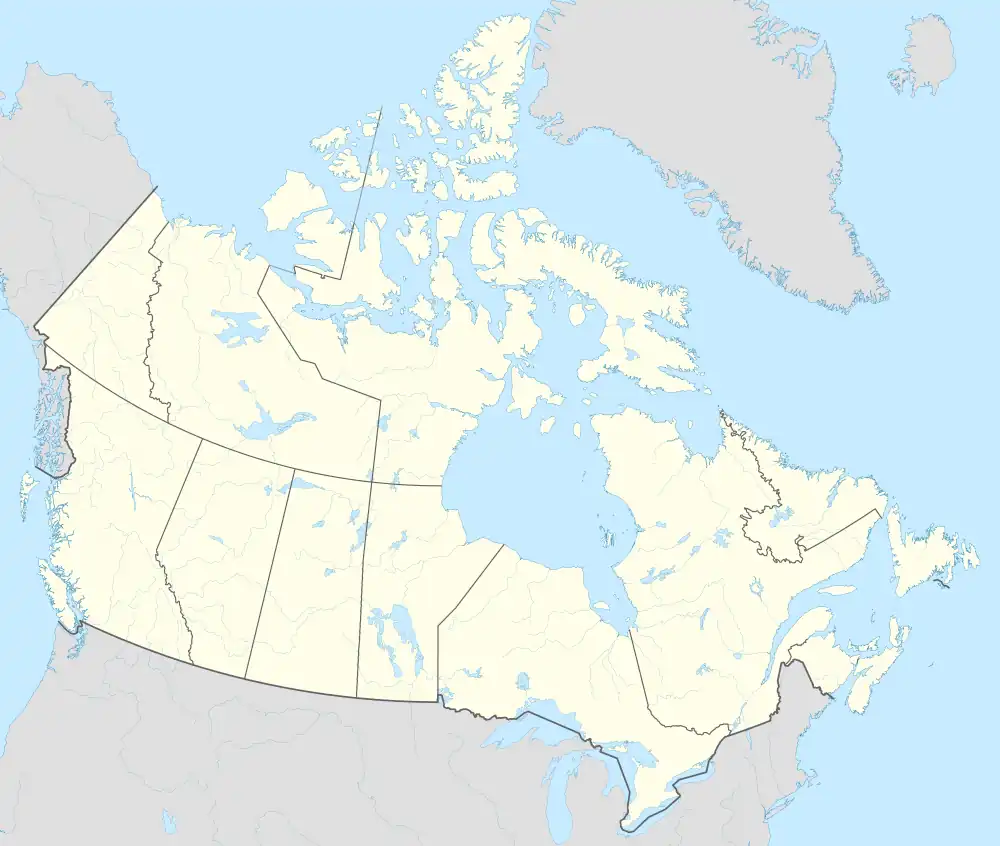Paynton | |
|---|---|
Village | |
.jpg.webp) | |
 Paynton Location of Paynton  Paynton Paynton (Canada) | |
| Coordinates: 53°00′46″N 108°56′11″W / 53.01278°N 108.93639°W | |
| Country | Canada |
| Province | Saskatchewan |
| Census division | 17 |
| Rural Municipality | Paynton |
| Post office founded | 1904 |
| Incorporated (village) | 1907 |
| Government | |
| • Mayor | Karolyn Kirby |
| • Administrator | Stephanie Knorr |
| • Governing body | Paynton Village Council |
| Area | |
| • Total | 0.85 km2 (0.33 sq mi) |
| Population (2016) | |
| • Total | 148 |
| • Density | 177.5/km2 (460/sq mi) |
| Time zone | CST |
| Postal code | S0M 2J0 |
| Area code | 306 |
| Highways | Highway 16 Highway 674 |
| [1][2][3][4] | |
Paynton (2016 population: 148) is a village in the Canadian province of Saskatchewan within the Rural Municipality of Paynton No. 470 and Census Division No. 17.
History
Paynton incorporated as a village on May 2, 1907.[5]
The first settlers of Paynton district were the Cinnamon family. This large family came down the North Saskatchewan River on a barge landing at the only suitable outlet along the bank. This outlet is now known as Cinnamon Landing.
Other pioneers, Mr. Paynter and Mr. McCready, Mr. Grafton and Mr. Fields, arrived in this district after a long trek from Fort Macleod. They were all RCMP Officers and came around the Riel Rebellion of 1885. https://en.wikipedia.org/wiki/North-West_Rebellion They homesteaded a farm and were the first to put up a fence which was done with rails. After some time, Mr. McCready died after being thrown from his horse.
Widowed Mrs. McCready left Paynton and moved Winnipeg. She later returned and married Mr. Paynter. He was noted for his kindness to strangers as well as his neighbors. He then retired from the RCMP and spent his remaining days assisting newcomers to the Paynton area.
The area locals wanted to name the settlement "Paynter" but Mr. Peter Paynter would not agree to this. He wanted some of his friends to be included in the name. There was also another place already called "Paynter". They decided to take the last letters from Grafton and create the village known as Paynton. In 1912 Paynton boasted of Dr. McKay, nurse Katie McKay, druggist Alex McKay, Eddie Langlais grocery store, K.E. Mahafey's general store, and Jim Bones general store, two hotels, a bakeshop, bank, poolroom, butcher shop, hall and our own Paynton newspaper. Also there was a lumber yard as well as two churches (Anglican and Presbyterian). Shows came to the hall periodically.[6]
A Post Office built by postmaster John Currie in 1967 and opened January 17, 1968.
Demographics
History
In the 2021 Census of Population conducted by Statistics Canada, Paynton had a population of 120 living in 62 of its 67 total private dwellings, a change of -18.9% from its 2016 population of 148. With a land area of 0.82 km2 (0.32 sq mi), it had a population density of 146.3/km2 (379.0/sq mi) in 2021.[9]
In the 2016 Census of Population, the Village of Paynton recorded a population of 148 living in 67 of its 86 total private dwellings, a -2% change from its 2011 population of 151. With a land area of 0.85 km2 (0.33 sq mi), it had a population density of 174.1/km2 (451.0/sq mi) in 2016.[10]
Climate
| Climate data for Paynton | |||||||||||||
|---|---|---|---|---|---|---|---|---|---|---|---|---|---|
| Month | Jan | Feb | Mar | Apr | May | Jun | Jul | Aug | Sep | Oct | Nov | Dec | Year |
| Record high °C (°F) | 9.0 (48.2) |
10 (50) |
16.5 (61.7) |
31.7 (89.1) |
36.0 (96.8) |
36.5 (97.7) |
35.0 (95.0) |
39.0 (102.2) |
34.0 (93.2) |
28.5 (83.3) |
19.4 (66.9) |
9.0 (48.2) |
39.0 (102.2) |
| Mean daily maximum °C (°F) | −11.6 (11.1) |
−8.4 (16.9) |
−0.8 (30.6) |
10.4 (50.7) |
18.7 (65.7) |
22.3 (72.1) |
24.3 (75.7) |
23.9 (75.0) |
17.5 (63.5) |
10.7 (51.3) |
−2.5 (27.5) |
−10.0 (14.0) |
7.9 (46.2) |
| Daily mean °C (°F) | −16.7 (1.9) |
−13.7 (7.3) |
−6.2 (20.8) |
4.0 (39.2) |
11.3 (52.3) |
15.3 (59.5) |
17.2 (63.0) |
16.2 (61.2) |
10.6 (51.1) |
4.3 (39.7) |
−7.1 (19.2) |
−15.0 (5.0) |
1.7 (35.1) |
| Mean daily minimum °C (°F) | −21.9 (−7.4) |
−19.0 (−2.2) |
−11.5 (11.3) |
−2.4 (27.7) |
3.8 (38.8) |
8.2 (46.8) |
10.1 (50.2) |
8.5 (47.3) |
3.6 (38.5) |
−2.2 (28.0) |
−11.6 (11.1) |
−19.9 (−3.8) |
−4.5 (23.9) |
| Record low °C (°F) | −45.0 (−49.0) |
−43.0 (−45.4) |
−38.3 (−36.9) |
−28.0 (−18.4) |
−7.0 (19.4) |
−1.5 (29.3) |
1.5 (34.7) |
−2.5 (27.5) |
−9.0 (15.8) |
−25.0 (−13.0) |
−37.0 (−34.6) |
−48.0 (−54.4) |
−48.0 (−54.4) |
| Average precipitation mm (inches) | 21.0 (0.83) |
14.7 (0.58) |
22.8 (0.90) |
30.7 (1.21) |
42.6 (1.68) |
69.5 (2.74) |
62.6 (2.46) |
48.1 (1.89) |
35.0 (1.38) |
14.9 (0.59) |
21.1 (0.83) |
23.7 (0.93) |
406.7 (16.01) |
| Source: Environment Canada[11] | |||||||||||||
See also
References
- ↑ National Archives, Archivia Net, Post Offices and Postmasters
- ↑ Government of Saskatchewan, MRD Home. "Municipal Directory System". Archived from the original on January 15, 2016. Retrieved 2014-07-06.
- ↑ Canadian Textiles Institute. (2005), CTI Determine your provincial constituency, archived from the original on 2007-09-11
- ↑ Commissioner of Canada Elections, Chief Electoral Officer of Canada (2005), Elections Canada On-line, archived from the original on 2007-04-21
- ↑ "Urban Municipality Incorporations". Saskatchewan Ministry of Government Relations. Archived from the original on October 15, 2014. Retrieved June 1, 2020.
- ↑ University of Southern Mississippi, Special Collections, University Libraries (2016-03-02). "Railroad Collection". doi:10.18785/fa.m169. Retrieved 2023-10-30.
{{cite web}}: CS1 maint: multiple names: authors list (link) - ↑ "Saskatchewan Census Population" (PDF). Saskatchewan Bureau of Statistics. Archived from the original (PDF) on September 24, 2015. Retrieved May 31, 2020.
- ↑ "Saskatchewan Census Population". Saskatchewan Bureau of Statistics. Retrieved May 31, 2020.
- ↑ "Population and dwelling counts: Canada, provinces and territories, census divisions and census subdivisions (municipalities), Saskatchewan". Statistics Canada. February 9, 2022. Retrieved April 1, 2022.
- ↑ "Population and dwelling counts, for Canada, provinces and territories, and census subdivisions (municipalities), 2016 and 2011 censuses – 100% data (Saskatchewan)". Statistics Canada. February 8, 2017. Retrieved May 30, 2020.
- ↑ Environment Canada - Canadian Climate Normals 1971-2000—Canadian Climate Normals 1971–2000, accessed 10 December 2010
6. ^ https://digitalcollections.ucalgary.ca/archive/Paynton---A-Collection-of-Stories-2R3BF1FRJNXK6.html "Paynton : A Collection of Stories", 1981, (CU14320209) by Paynton Consolidated School Board. corporate. Courtesy of Local Histories Collection, Libraries and Cultural Resources Digital Collections, University of Calgary.
